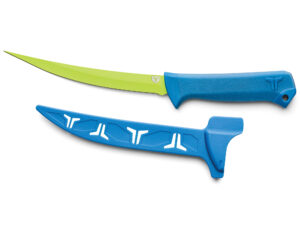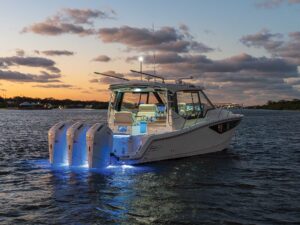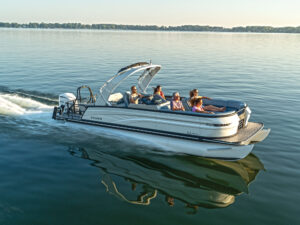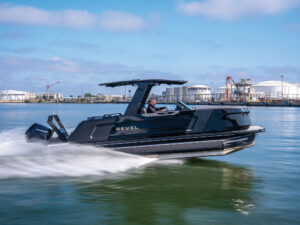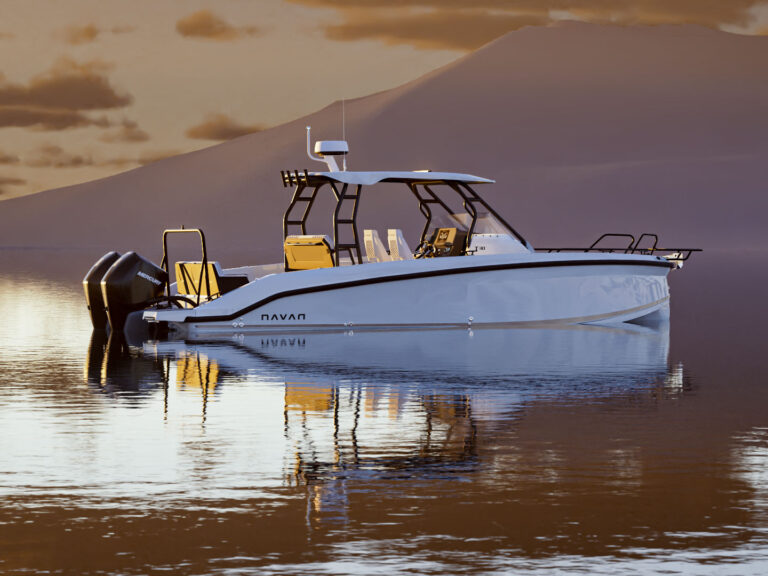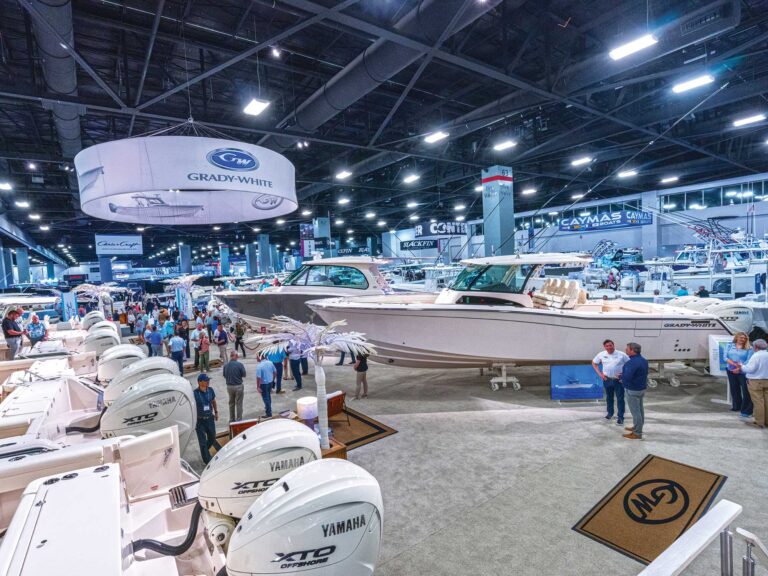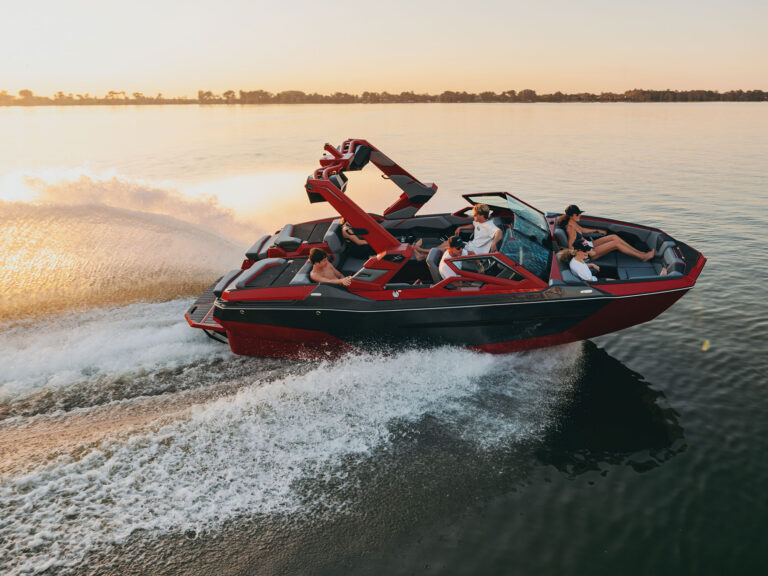Overview
If you were to put clothes on the 400CC, it would wear a thin-lapelled tuxedo over boardshorts. Few center-consoles bring more style and comfort to the water while maintaining lethal fishability.

Seabring Marine, parent of Monterey, relaunched the storied Blackfin brand six years ago, planning to elevate its reputation from raw fishability to posh-styled cruising and fishing while maintaining a midrange price. We think the company overshot that goal, providing luxury and style in a big center-console while managing to keep the price competitive.
Seabring’s first step in bringing Blackfin’s design elements together was to make standard the highest tech propulsion, navigation, air-conditioning and house-power systems. It provides a package list of standard features, including dual navigation displays, a windlass, a bow thruster, Mercury engines with joystick steering and VesselView displays. So, each boat slips down the line efficiently, with each assembly crewmember well-versed in the installation of each component, eliminating quality-control surprises at the end of the line.

The helm is arranged in a futuristic glass cockpit, with standard 24-inch Garmin multifunction displays on the black dash and a 9-inch Mercury VesselView display overhead on the underside of the beefy hardtop. There’s joystick control, electric power steering, and Mercury’s new smooth, convenient digital throttle and shift with an important recent upgrade: The neutral shift-position indicator is on top of the throttle handle, where you can see it without peeking around. It adds an element of convenience and safety.
Engines
Weighing in at over 10 tons, the 400CC is still sprightly, coming onto plane in an average of 8.9 seconds and hitting 30 mph at around 10.9 seconds. The optimal fuel economy is found in a broad window of 4,000 to 5,000 rpm and speeds of 35 to 52 mph, with a cruising range at those speeds of over 200 miles on 475 gallons of fuel. The hull is a double-step Michael Peters design, and it worked well in challenging seas. With a light load, the 400CC made better than 70 mph. Loaded to fish, the nimble ship still made 68 mph. A 4-foot chop was no challenge for it.

The Blackfin is designed with high bows for big waters, and while the bow rise is in line with competitors on hole shot without tabs, using tabs minimized that effect while maintaining acceleration speed. Blackfin chose the high bows over the low-slung, stiletto look of some competitors to give confidence to families running in inclement weather.

Interior and Accessories
The helm deck and spacious cabin below are air-conditioned, and that system, along with an owner-added stabilizing gyro, is powered by a high-capacity lithium battery bank. Running the AC dockside for 24 hours resulted in a 50 percent drawdown, but the four powerful 150-amp, 12-volt engine alternators brought the bank back to full in one hour. The standard lithium system eliminates a space-hogging genset along with its annoying rumble, diesel fuel supply and toxic fumes.
For luxury cruising, the 400CC offers dual helm row-style, three-wide seating, with electric adjustments to the captain’s center seat and seat heaters across both rows. Add the standard convenience of a berth below with a convertible settee, mini galley and roomy head, and the convenience package is fully charged.
Blackfin might not have been targeting Scout’s 400 LXF when it built the 400CC, but there are few 40-foot competitors. Robalo hits 36 feet and Cobia taps 35. The Scout 400 LXF pops the bank for $1,156,215 without many of the standards on the Blackfin, such as lithium house batteries, dual 24-inch Garmins and radar. Well, virtually all the standards on the 400CC are options on the 400 LXF. Scout’s rigging station leaning post is an option. Where it compares is with the high bows, comparable luxury appointments and style. Scout beats the Blackfin in livewells, offering two 66-gallon wells at the transom compared to Blackfin’s 70-gallon tank aft and 30-gallon tank at the bow.

The second-row seating is backed by a dual-purpose rigging station on top and a Kenyon grill and sink beneath the lift-up rigging lid. Tackle storage is generous in drawers facing aft and cabinets on the leaning-post sides. Dual slide-out coolers in the rigging station chill refreshments. Rod holders abound, with 14 in the hardtop, six in each gunwale, and six on the transom. There is even a standard removable transom lounge with three more shotgun holders. This posh seat fastens over the transom livewell, with a hatch to access bait through the seat.
Blackfin built a beautiful, seriously fishable, luxuriously comfortable center-console that we suspect will find itself tending yachts in Caribbean harbors when it’s not doubling as a sailfish-tournament platform.

How We Tested
- Engines: Quad Mercury 400 V-10 Verados
- Drive/Props: Outboard/Mercury Rev X 27″ pitch 4-blade stainless steel
- Gear Ratio: 2.08:1 Fuel Load: 225 gal. Water on Board: 100 gal. Crew Weight: 300 lb.

High Points
- A dive door with a ladder and a transom door offer dual boarding options.
- Blackfin’s convenient, access to electronics panels, pumps, batteries and other systems eases service.
- Style, comfort and lethal fishability.
Low Points
- An upper station is not available from Blackfin, but the hardtop is designed to accept an aftermarket system.
- Removable transom seat is clever, but we’d like to see more cockpit seating.
Pricing and Specs
| Price: | $1,106,945 (manufacturer’s advertised price with test power) |
| LOA: | 39’10” |
| Beam: | 12’0″ |
| Draft (max): | 3’9″ (engines down) |
| Displacement (approx.): | 20,000 lb. |
| Transom Deadrise: | 23 degrees |
| Max Cabin Headroom: | 6’5″ |
| Bridge Clearance: | 8’11” |
| Fuel Capacity: | 475 gal. |
| Max Horsepower: | 1,600 |
| Available Power: | Quad Mercury 400 V-10 Verado outboards |
Speed, Efficiency, Operation


